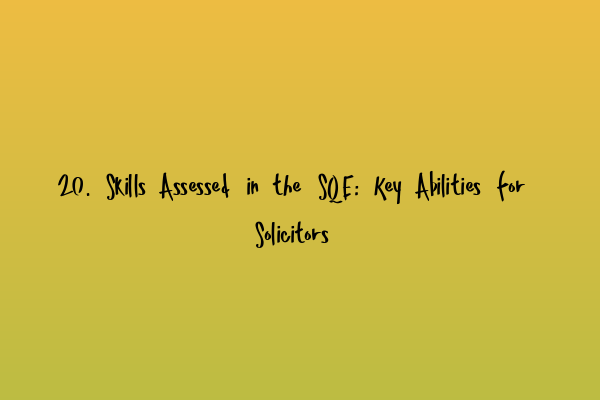20 Skills Assessed in the SQE: Key Abilities for Solicitors
As you gear up to pursue a career in law and become a qualified solicitor, you will inevitably come across the Solicitors Qualifying Exam (SQE). The SQE is designed to assess your competence across a range of legal skills and knowledge necessary for the practice of law. In this blog post, we will explore the 20 key skills assessed in the SQE and why they are essential for aspiring solicitors.
1. Legal Knowledge: This includes a deep understanding of various areas of law, such as contract law, criminal law, and property law. Demonstrating a solid foundation of legal knowledge is crucial to success in the SQE.
2. Legal Research: The ability to conduct effective legal research is vital for solicitors. This skill involves locating relevant legal authorities, analyzing case law, and applying legal principles to specific scenarios.
3. Problem-Solving: Solicitors are often faced with complex legal issues that require innovative solutions. The SQE assesses your ability to identify legal problems, analyze the facts, and propose practical solutions.
4. Legal Drafting: Drafting legal documents is a fundamental skill for solicitors. The SQE evaluates your proficiency in writing contracts, pleadings, and other legal documents with precision, clarity, and consistency.
5. Case Analysis: Analysing case materials and identifying the key issues is a critical skill for solicitors. The SQE tests your ability to extract relevant information from case scenarios, evaluate evidence, and construct persuasive arguments.
6. Critical Thinking: The ability to think critically and assess complex legal problems is crucial for solicitors. The SQE assesses your capacity to analyze, evaluate, and challenge legal principles and arguments.
7. Oral Communication: Effective communication is essential for solicitors to interact with clients, colleagues, and other stakeholders. The SQE evaluates your ability to express legal concepts clearly and persuasively both in oral presentations and discussions.
8. Written Communication: Solicitors often need to communicate legal advice and opinions in writing. The SQE assesses your ability to convey legal information in a clear, concise, and coherent manner, tailored to the intended audience.
9. Advocacy: Advocacy skills are vital for solicitors engaged in court proceedings. The SQE evaluates your ability to present legal arguments, cross-examine witnesses, and persuade judges or juries.
10. Negotiation: Solicitors frequently engage in negotiations to settle disputes or reach agreements. The SQE assesses your ability to negotiate effectively, considering legal principles, client interests, and ethical considerations.
11. Client Care: Building strong client relationships and providing exceptional customer service is crucial for solicitors. The SQE evaluates your ability to understand and respond to client needs, maintain confidentiality, and manage client expectations.
12. Professional Ethics: Upholding professional ethics and maintaining high standards of integrity are core principles of the legal profession. The SQE assesses your knowledge and understanding of legal ethics, including conflicts of interest, confidentiality, and professional conduct.
13. Time Management: Solicitors often work under tight deadlines and must manage multiple tasks simultaneously. The SQE evaluates your ability to prioritize work, meet deadlines, and efficiently allocate resources.
14. Business and Financial Awareness: Solicitors need a sound understanding of business and financial principles to provide effective legal advice. The SQE assesses your knowledge of business structures, financial statements, and relevant commercial law.
15. Analytical Skills: The ability to analyze complex legal issues and apply legal principles is critical for solicitors. The SQE assesses your analytical skills, including the ability to identify key legal factors and evaluate their implications.
16. Problem-Solving in a Legal Context: The SQE assesses your ability to apply legal knowledge to practical scenarios, analyze possible solutions, and recommend appropriate courses of action.
17. Attention to Detail: Solicitors must have a keen eye for detail to identify potential legal risks and ensure accuracy in legal documents. The SQE evaluates your ability to spot inconsistencies, errors, and omissions in legal materials.
18. Teamwork: Collaborating effectively with colleagues and other professionals is essential for solicitors. The SQE assesses your ability to work as part of a team, contribute constructively, and resolve conflicts.
19. Adaptability: The legal profession is dynamic, and solicitors must adapt to new laws, regulations, and changing circumstances. The SQE assesses your ability to adapt your legal knowledge and skills to different contexts.
20. Resilience: The legal profession can be challenging, and solicitors must demonstrate resilience in the face of adversity. The SQE evaluates your ability to handle stress, manage your workload, and maintain a professional demeanor.
Developing these key skills is crucial not only for success in the SQE but also for a rewarding career as a solicitor. To enhance your chances of success in the SQE, consider enrolling in SQE 1 Preparation Courses or SQE 2 Preparation Courses that focus on these essential skills.
To further assess and enhance your legal knowledge and skills, we recommend exploring SRA SQE Exam Dates and taking advantage of resources like SQE 1 Practice Exam Questions and SQE 1 Practice Mocks FLK1 FLK2.
By honing these skills and preparing diligently for the SQE, you will be well-equipped to embark on a successful career as a qualified solicitor. Good luck on your SQE journey!
